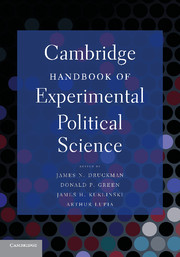Book contents
- Frontmatter
- Contents
- List of Tables
- List of Figures
- Contributors
- Acknowledgments
- INTRODUCTION
- PART I DESIGNING EXPERIMENTS
- PART II THE DEVELOPMENT OF EXPERIMENTS IN POLITICAL SCIENCE
- PART III DECISION MAKING
- 10 Attitude Change Experiments in Political Science
- 11 Conscious and Unconscious Information Processing with Implications for Experimental Political Science
- 12 Political Knowledge
- PART IV VOTE CHOICE, CANDIDATE EVALUATIONS, AND TURNOUT
- PART V INTERPERSONAL RELATIONS
- PART VI IDENTITY, ETHNICITY, AND POLITICS
- PART VII INSTITUTIONS AND BEHAVIOR
- PART VIII ELITE BARGAINING
- PART IX ADVANCED EXPERIMENTAL METHODS
- AFTERWORD
- Name Index
- Subject Index
- References
12 - Political Knowledge
Published online by Cambridge University Press: 05 June 2012
- Frontmatter
- Contents
- List of Tables
- List of Figures
- Contributors
- Acknowledgments
- INTRODUCTION
- PART I DESIGNING EXPERIMENTS
- PART II THE DEVELOPMENT OF EXPERIMENTS IN POLITICAL SCIENCE
- PART III DECISION MAKING
- 10 Attitude Change Experiments in Political Science
- 11 Conscious and Unconscious Information Processing with Implications for Experimental Political Science
- 12 Political Knowledge
- PART IV VOTE CHOICE, CANDIDATE EVALUATIONS, AND TURNOUT
- PART V INTERPERSONAL RELATIONS
- PART VI IDENTITY, ETHNICITY, AND POLITICS
- PART VII INSTITUTIONS AND BEHAVIOR
- PART VIII ELITE BARGAINING
- PART IX ADVANCED EXPERIMENTAL METHODS
- AFTERWORD
- Name Index
- Subject Index
- References
Summary
In political surveys, many citizens fail to answer, or provide incorrect answers to, fact-based questions about political figures and institutions. A common inference drawn from such failures is that citizens' poor performance on surveys reflects their incompetence in democratically meaningful contexts such as voting booths.
The scholarly home for such findings is the academic literature on political knowledge. A common analytic definition of political knowledge is that it is a measure of a citizen's ability to provide correct answers to a specific set of fact-based questions. Typical political knowledge questions include “What is the political office held by [name of current vice president, British prime minister, or chief justice of the United States]?” and “Which political party has the most seats in the U.S. House of Representatives?” Many people have used responses to survey-based political knowledge questions to criticize the public for its general incompetence.
In recent years, these criticisms have come under increasing scrutiny (e.g., Graber 1984; Popkin 1994). Some scholars raised questions about the practice of basing broad generalizations of citizen competence or knowledge on a relatively small set of idiosyncratic, fact-based survey questions (e.g., Lupia 2006). Others uncovered logical and factual errors in claims about the kinds of political knowledge that are needed to make important political choices competently (e.g., Lupia and McCubbins 1998; Gibson and Caldeira 2009).
- Type
- Chapter
- Information
- Cambridge Handbook of Experimental Political Science , pp. 171 - 184Publisher: Cambridge University PressPrint publication year: 2011
References
- 27
- Cited by

